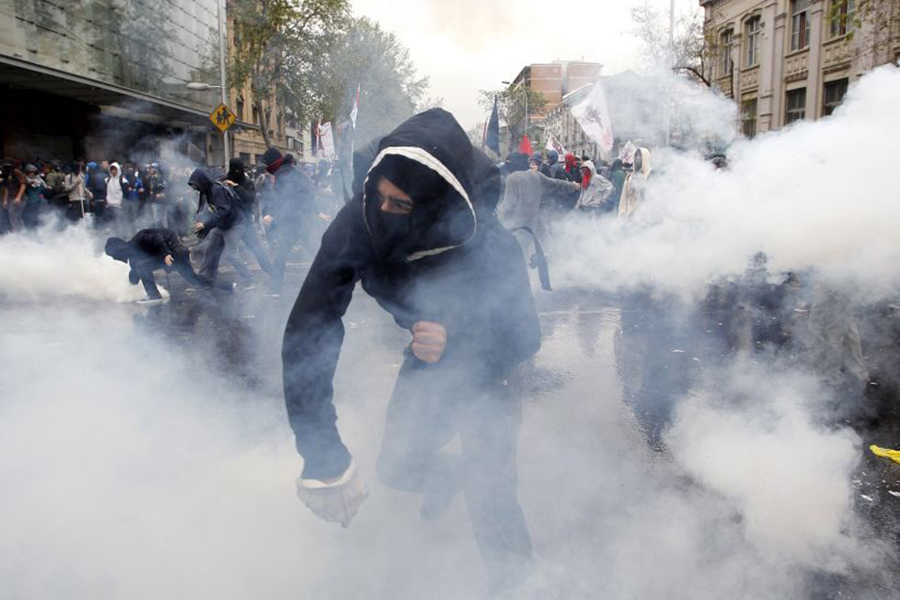
Violence seems to be everywhere in America. Last month, police identified the perpetrator behind a series of attempted mail bombings targeting key Democratic officials. Later that same week, a neo-Nazi gunman engaged in the deadliest anti-Semitic attack in U.S. history, murdering eleven people at a Pittsburgh synagogue. Extremists appear to be emboldened by today’s climate, as we currently live in one of the most tense environments of our lifetimes.
Even before the horror of last month’s tragedies, one could tell that elements of American society were rapidly degenerating into barbarity. October alone saw an increase in the frequency of political street brawls breaking out across the United States. In New York, street fighting broke out in front of the Metropolitan Republican Club in Manhattan where Gavin McInnes, the Vice Media co-founder turned far-right ideologue, was scheduled to deliver a speech. After the speech, McInnes, flanked by several members of his self-proclaimed “western chauvinist” organization the Proud Boys, confronted a group of Antifa protesters, resulting in an episode of violence that culminated in criminal charges against 12 people.
The following night in Portland — which recently has seen nearly weekly incidents of political street violence — the Proud Boys and Antifa clashed once again, this time at an intentionally provocative demonstration organized by the right-wing group Patriot Prayer. In this sense, 2018 has served as a continuation of a wretched 2017 that saw politicians assaulted and shot, civilians massacred in a religiously-motivated terror attack and a deadly white nationalist rally that brought out America’s absolute worst.
Unfortunately, political violence in modern America isn’t something new. From 1968 to 1972, America saw some of the most hostile domestic attacks in its history, often by politically motivated groups but also through overly aggressive policing government forces against protestors. The assassination of Martin Luther King Jr. in April 1968 resulted in riots in over 100 cities across the United States, with local governments and National Guard forces excessively targeting mostly low-income, African-American protestors.
Later that summer, after winning the California primary, Robert Kennedy was shot to death in a Los Angeles hotel lobby over his support for Israel in the Six Day War. Then, at the 1968 Democratic National Convention, eight days of tension between the Chicago Police Department and anti-war protestors culminated in a “police riot” on the final night, with police forces violently assaulting protestors in Lincoln Park. Violence continued well into the next decade; in an 18-month period from 1971 to 1972, the FBI recorded over 2,500 bombings on American soil. As one former Nixon aide put it: “2018 is not quite 1968, at least not yet.”
But we shouldn’t let this fact assuage our worries. Political violence, whether conducted through the government or via ideologically motivated non-state actors, is indicative of a fracturing society. And while (well, depending on who you ask), we aren’t on the verge of civil war quite yet, we should still be worried. The steady escalation and gradual normalization of open violence almost always sets the stage for something worse. In Weimar Germany, violence between the far-right Freikorps and Communist revolutionaries gave way to a power vacuum that helped facilitate the rise of Nazism. Recently in Venezuela and Turkey, political strongmen have utilized instability to accrue increasingly authoritarian political power.
Even though there is ample reason to think that something so drastic couldn’t occur on our soil — America’s democratic institutions are significantly stronger than these examples ever were — we still shouldn’t discount the possibility. Much of what has occurred in the U.S. now was entirely unimaginable a decade or two ago. The highly polarizing and populist-driven 2016 election emerged in what was a relatively healthy economic environment; now imagine what could occur in a country suddenly marred by an unsuspecting economic downturn or debilitating war. The results could be chilling, which is why it is important to safeguard the democratic institutions that prevent the worst from materializing.
We cannot allow political violence to be normalized, whether from extremist groups or through police militarization. Don’t make the mistake of saying it can’t happen here.
Written by: Brandon Jetter — brjetter@ucdavis.edu
Disclaimer: The views and opinions expressed by individual columnists belong to the columnists alone and do not necessarily indicate the views and opinions held by The California Aggie.



